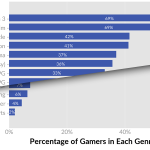Content Table:
Online Gaming – The Basics
The Rise of Digital Gaming
The popularity of digital gaming knows no bounds. From classic titles like Tetris and Super Mario to modern massively multiplayer online role-playing games (MMORPGs), gaming appeals to a broad audience across age and gender. This includes youths, teenagers, women, men, children, and older adults alike. For younger players, gaming provides entertainment and a fun escape, while older individuals often turn to games to alleviate loneliness and foster connections with others.
Statistics reveal that 41% of gamers are women and over 43% of gamers are aged 25-49, indicating that gaming is not just for the youth. According to the prestigious research firm IDC, online gaming is projected to reach a staggering 256 million users by 2008, showcasing its tremendous growth potential.
Types of Online Games
Digital games can generally be classified into two categories: stored games and online games. Stored games are typically played on consoles, while online games are accessed through a computer using either a broadband or dial-up Internet connection. However, many consoles now come with Internet capabilities, allowing players to enjoy online gaming on their favorite devices.
Why is Online Gaming So Popular?
Several factors contribute to the increasing popularity of digital gaming. Firstly, online games captivate players’ imaginations and engage multiple senses: sight, sound, and touch. Many games require intelligence and strategic thinking, making them not only entertaining but also mentally stimulating.
With complex graphics, vibrant colors, and high-quality virtual realities, online games are designed to keep players engaged for hours. The advent of multiplayer gaming further elevates the experience, introducing challenges and opportunities to conquer new horizons.
Ways to Play Online Games
Online games can be accessed in various ways:
- Using e-mail invitations to join games
- Playing directly in a browser window via a web address
- Connecting through Internet Relay Chat, Telenet, MUD (Multi-User Dungeon) clients, or web-based forums
- Using stand-alone software to play with or against others
System Requirements for Online Gaming
To enjoy online gaming, players need to meet certain system requirements:
- A reliable Internet connection
- A personal computer or gaming console
- Specific software required for particular games
Players can choose from a wide range of games, including simple classics like Tetris and Super Mario, or more complex titles like online ping pong. The simulation games category mimics real-life situations and encompasses various genres, including combat, city planning, strategy, and flight simulation.
Optimizing Your System for Gaming
For serious gaming, optimizing computer performance is essential. Here are some steps to enhance your system:
- Run disk defragmentation at least once a month.
- Use Scandisk weekly to correct folder and file errors.
- Clear your hard drives of Internet files, temporary files, and recycle bin contents to free up space.
- Regularly update your operating system software and download new security patches.
- Keep video drivers updated for optimal performance.
- Utilize a backup system to clear hard drive space.
- Remove any spyware that may have been installed from websites.
- Minimize the number of programs running while playing graphic-intensive games to prevent slowdowns.
- Run an anti-virus program regularly, but consider disabling it when loading or playing games to avoid performance issues.
The Global Reach of Online Gaming
The Internet enables gamers to compete with others across the globe. Whether using PCs or consoles, the choice depends on personal preference, budget, and other considerations. The ability to connect with fellow gamers worldwide is one of the most exciting aspects of online gaming, creating a vibrant community where players can share experiences, strategies, and camaraderie.
Conclusion
Online gaming is a dynamic and ever-evolving landscape that caters to a diverse audience. With its roots in classic games and its expansion into immersive multiplayer experiences, it continues to captivate players of all ages. As technology advances and the gaming community grows, the future of online gaming looks promising, ensuring that there will always be new adventures waiting just a click away.



